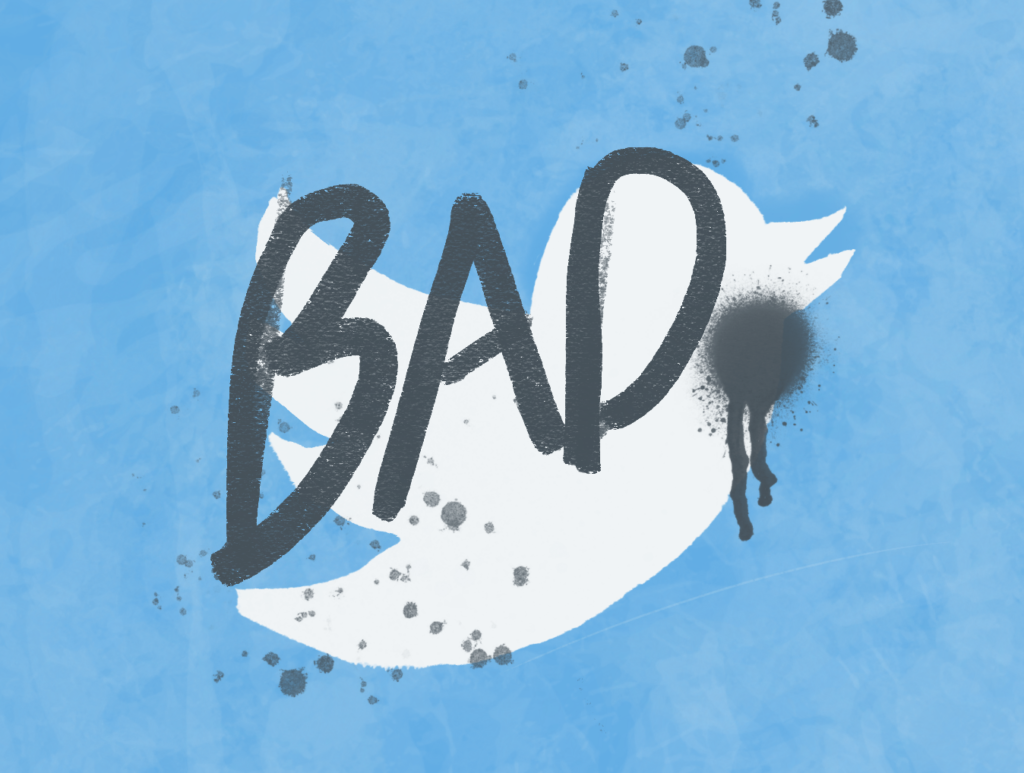A prominent example of this was when highly influential conspiracy theorist Alex Jones leveraged the power of the internet to spread lies about everything from antisemitic “New World Order” theories to claiming that patrons of the 2016 Pulse nightclub shooting in Orlando, most of whom were Latino and in the queer community, worked to promote pedophilia and child abuse.
On Oct. 28, Elon Musk officially consummated his heavily publicized $44 billion acquisition of Twitter, a deal which had been in the air for months. Buying Twitter was more than a simple business transaction; it was a decision with significant societal consequences. Backlash against Musk’s Twitter takeover has been substantive: He purchased the platform with the intent of deregulation, a move which critics claim will cause a surge of hate speech and harassment.
Criticism against Musk is deserved, considering his unethical workplace expectations for employees, the thousands of layoffs that blindsided Twitter employees on Nov. 3 and his union-busting tendencies. However, much of the criticism is levied on one distinctly untrue assumption that there is a fight to preserve the “soul of Twitter,” and that it is a platform whose sanctity needs to be protected from the likes of Musk.
Yes, Musk’s acquisition will have negative effects on the success of the company, as his current outlook on social media clashes with Twitter’s user base and model of regulation. But the fact that this business acquisition is feared to have larger political consequences on American society is a symptom of the undue influence all of us have allowed Twitter to hold over our sociopolitical landscape.
The reality is that Twitter is terrible beyond repair on so many levels. This takeover is the perfect time to delegitimize the platform and release its grip on America once and for all.
In the 12 hours following confirmation of Musk’s acquisition, the use of the n-word in tweets increased 500%, according to the Network Contagion Research Institute. The exponential increase in hate speech and slurs during this time was attributed to Musk’s position as a “free speech absolutist,” encouraging people to post racial epithets as an expression of their newfound freedom of speech on Twitter.
Although Musk’s reason for buying Twitter was indeed to deregulate it, the fact is that Twitter has featured racists since its inception in 2006. The inherent nature of Twitter’s platform — the anonymity it provides, the constant stream of short text-posts with huge viral potential and the ability to amplify others’ tweets by quoting and retweeting — means that no complex algorithms or technical development can stem the constant flow of racial hatred by many of its users. In addition, Twitter offers a sense of legitimacy absent in other similar platforms like Tumblr or Reddit because of the presence of politicians, celebrities, news personalities and industry elites who use it.
Jones’ constant “false-flag” conspiracies culminated in Inforward getting banned from major platforms such as Facebook, Apple, YouTube and Spotify — yet, the only company that refrained from banning Jones despite his vehemently bigoted content was Twitter. Jack Dorsey, the CEO at the time, claimed that Jones’ content “hasn’t violated our rules.” Twitter finally banned Jones when a video surfaced of him verbally harassing a journalist with personal insults. At this moment, Twitter’s moderation showed us that they would draw the line at personal harassment but could tolerate hate speech targeted at groups of people.
Dorsey told the Atlantic, “[Twitter] creates more understanding, more empathy, for how people wake up and live their day and then go to sleep. And if you have more empathy, that creates less contention, less conflict.”
There is nothing understanding and empathetic about a platform that has a history of being mobilized by white supremacists and organizations and being used as one of the biggest sources of propaganda and disinformation. Did Twitter succeed in creating “less contention” and “less conflict” when it gave a verified blue checkmark to Jason Kessler, the founder of the infamous Unite the Right rally in Charlottesville (a grotesque celebration of white supremacy)? Or when it refused to acknowledge the fact that its algorithms most efficiently boost fringe political rhetoric?
The truth is that Twitter has always been a harmful company. The only real difference between the leadership of prior CEOs and Musk’s is that Musk is much more transparent about his plans for the company, while pre-Musk Twitter hid its poisonous nature behind trivial virtue signaling and vague promises (like the #BlackLivesMatter bio of the Twitter page). Performative sentiments mean nothing when the libertarian “free and open global internet” that Dorsey claims Twitter represents is really just led by technocratic billionaires who don’t believe that vitriol against racial minorities is severe enough to result in consequences. These are the people who have turned a blind eye to — or worse, encouraged — Twitter’s contribution to the destabilization of democracy in recent years.
Twitter’s entire premise is antithetical to the ideas of democracy. It’s often been heralded as a platform that stimulates open political conversation, and consequently, compromise and cooperation. In reality, it is virtually impossible to carry out constructive dialogue and address the nuances of politics that affect real people in 280 characters. Political discourse on Twitter, even between actual politicians, more often takes the form of trash talk and inflammatory rhetoric instead of constructive conversation. How could we ever expect it to be any other way on a platform whose algorithm encourages controversy and whose users are able to disproportionately amplify fringe speech?
Twitter has been beyond repair since inception, and allowing it to play a part in American politics has caused irreparable problems in the nation’s social and political consciousness, whether it be the exponential increase in misinformation and polarization, the amplification of extremist voices or the company’s failure to address racial violence.
Instead of protesting about how Musk is destroying Twitter, we must face the reality that he is simply exploiting the inherently harmful nature of the social media platform. A single person can only further destroy a broken system so much, and the only true solution to prevent further harm is to simply let Twitter die out. Regulation has proven largely unsuccessful thus far, so the best course of action is to boycott the platform as both consumers and advertisers, and let Musk drive it to the ground.

























